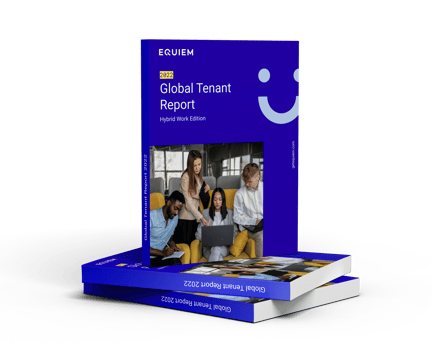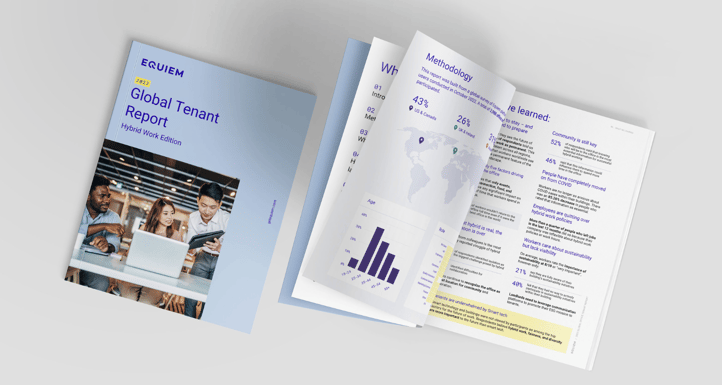Equiem has completed our annual survey of office workers from around the world, with almost 3,000 users telling us what they value about their workplace.
2022 marks the third year in a row that Equiem has conducted a wide-ranging survey of our global user base. We asked 2,988 workers from the US, Canada, Australia, UK, and Ireland a diverse range of questions about their experiences, needs, and desires at work. Read the report here to learn what today's office workers think about hybrid work, sustainability, and much more!
Equiem's Global Tenant Report 2023
The report offers detailed, data-driven insights into the way today's office tenants are navigating what we've come to know as 'the new normal'. It paints a picture of a world in which flexibility and community have become top priorities for workers, while more traditional aspects of the workplace experience have begun to drift into the background.
Hybrid work is here to stay
The clearest takeaway from this year's survey is that hybrid work is more than just a flash in the pan. 78% of workers believe hybrid work will continue to be a major part of the office landscape in the future, while the majority also view it as positive for their productivity and work/life balance. It's clear that workers want hybrid work to become the new status quo.
Companies, by and large, have accepted that reality. Commercial landlords need to accept it too. In order to protect the continued success of their assets, landlords must build strategies that take hybrid work into account.

The office is for socializing
Perhaps the most shocking trend in our survey is that workers no longer view the office as a place for work. As such, the particulars of the physical office space are unimportant. 40% of workers wouldn't spend more time in the office even if it were the best office in the world. The fact is, the office space itself isn't what's driving workers to attend in person. So, what is?
Workers in our survey were clear about the motivators bringing them to the workplace. They want community, collaboration, and amenities. Our data shows that only events, community, connection, food, and amenities have any significant impact on the amount of time that workers spend in the workplace.
People no longer view the office as an obligation, but rather as a destination. For workers to voluntarily spend time in the office, they need to feel like they're gaining something. Throughout our survey, they identified the office as a place where they could socialize and collaborate with colleagues, attend exciting events, and even indulge in nearby dining and shopping.
Isolated workers need a place to get what they've been missing. The office of the future must be that place.
Sustainability Matters
Workers care about sustainability, overwhelmingly ranking it as "very important". However, they also lack visibility into the sustainability mission of their building. Only 21% of workers say they are fully aware of their building’s sustainability initiatives.
Adding to the problem, more than 40% of respondents felt that they had no way to actively participate in sustainability initiatives within their building. The end result is workers passionate about sustainability wondering what their building is doing... or even if their workplace shares their passion.
Our Global Tenant Report features advice on how to close what we're calling "the sustainability gap". For 67% of workers, the importance of this issue has increased in the last three years, and that trend will only continue. Don't let your building fall behind!
Learn more in our Global Tenant Report eBook
These insights are only tip of the iceberg. We asked thousands of tenants more than 40 questions about their experience in the workplace, what they foresee in the future, and much more. Download our Global Tenant Report to see a detailed breakdown of what we learned from workers in offices around the world.
The future is coming, and it looks very different to the past. The only way to ensure your commercial asset is future-proof is to ground your strategy in reliable data and the sentiments of real workers.




